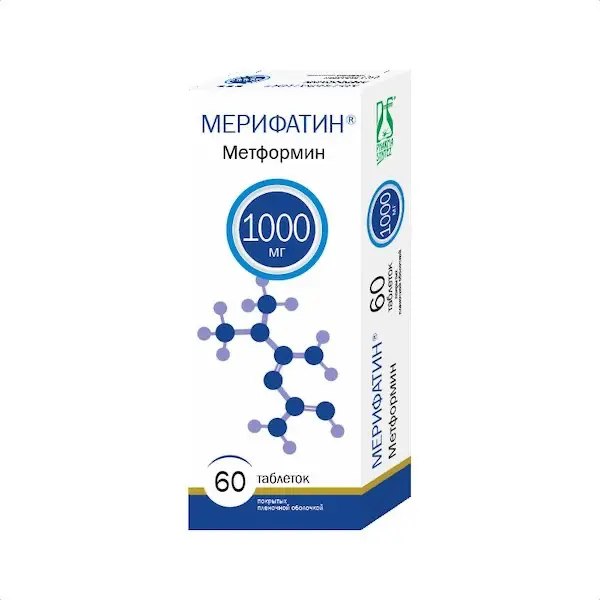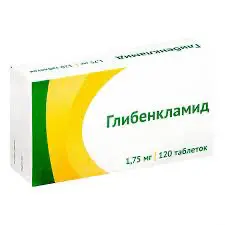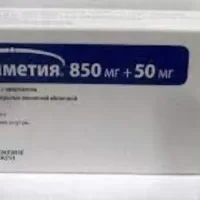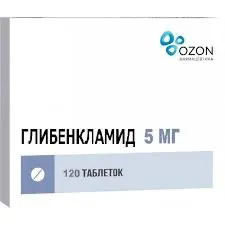Description
Merifatin Pharmacodynamics
Metformin reduces hyperglycemia without leading to the development of hypoglycemia. Unlike sulfonylurea derivatives, it does not stimulate insulin secretion and has no hypoglycemic effect in healthy individuals. Increases the sensitivity of peripheral receptors to insulin and glucose utilization by cells. Reduces glucose production by the liver by inhibiting gluconeogenesis and glycogenolysis. Delays the absorption of glucose in the intestine. Metformin stimulates glycogen synthesis by acting on glycogen synthase. Increases transport capacity of all types of membrane glucose transporters. In addition, it has a favorable effect on lipid metabolism: it reduces total cholesterol, low-density lipoproteins and triglycerides.
During metformin administration, the patient’s body weight either remains stable or decreases moderately. Clinical studies have also shown the effectiveness of metformin for the prevention of diabetes in patients with prediabetes with additional risk factors for obvious type 2 diabetes, in whom lifestyle changes did not allow to achieve adequate glycemic control.
Indi
cations
Type 2 diabetes mellitus, especially in obese patients with ineffectiveness of diet therapy and physical activity:
– In adults as monotherapy or in combination with other oral hypoglycemic agents or with insulin;
– In children from 10 years of age, as monotherapy or in combination with insulin. Prophylaxis of diabetes mellitus type 2 in patients with prediabetes mellitus type 2 with additional risk factors of development of diabetes mellitus type 2, in whom changes in lifestyle did not allow to achieve adequate glycemic control.
Contraindications
– Hypersensitivity to metformin or any excipient;
– Diabetic ketoacidosis, diabetic precoma, coma;
– Renal insufficiency or impaired renal function (creatinine clearance less than 45 ml/min);
– acute conditions with risk of renal dysfunction: dehydration (diarrhea, vomiting), severe infectious diseases, shock;
– clinically expressed manifestations of acute or chronic diseases that may lead to the development of tissue hypoxia (including acute heart failure, chronic heart failure with unstable hemodynamic parameters, respiratory failure, acute myocardial infarction);
– major surgical operations and injuries when insulin therapy is indicated (see section “Special Indications”);
– hepatic insufficiency, liver dysfunction;
– chronic alcoholism; acute alcohol poisoning;
– pregnancy;
– lactoacidosis (including in anamnesis);
– use for less than 48 hours before and within 48 hours after radioisotopic or radiological studies with the introduction of iodine-containing contrast agent (see section “Interaction with other medicinal products”);
– adherence to a hypocaloric diet (less than 1000 kcal/day).
Dosage and administration
- Administered orally.
- Adults:
- Monotherapy and combined therapy in combination with other oral hypoglycemic agents in type 2 diabetes mellitus:
– The usual starting dose is 500 mg or 850 mg 2-3 times daily after or during meals.
– Every 10-15 days, it is recommended that the dose be adjusted based on the results of plasma glucose concentration measurements. Slowly increasing the dose helps to reduce gastrointestinal side effects.
– The maintenance dose of the drug is usually 1500-2000 mg/day. To reduce gastrointestinal side effects, the daily dose should be divided into 2-3 doses. The maximum dose is 3000 mg/day divided into three doses.
– Patients taking metformin at doses of 2000-3000 mg/day may be switched to Merifatin 1000 mg. The maximum recommended dose is 3000 mg/day divided into 3 doses. - If switching from another hypoglycemic drug is planned: the other drug should be discontinued and the metformin drug should be started at the dose indicated above.
- Combination with insulin:
To achieve better blood glucose control, metformin and insulin in patients with type 2 diabetes can be used as combination therapy. - The usual starting dose of metformin is 500 mg or 850 mg 2-3 times a day, while the dose of insulin is adjusted based on blood glucose concentrations.
- Children and adolescents: In children from the age of 10, metformin can be used both as monotherapy and in combination with insulin. The usual starting dose is 500 mg or 850 mg once daily after or with a meal. The dose should be adjusted after 10-15 days on the basis of blood glucose concentration. The maximum daily dose is 2000 mg divided into 2-3 doses.
- Monotherapy for prediabetes:
The usual dose is 1000-1700 mg daily after or during meals, divided into 2 doses. Regular glycemic control is recommended to assess the need for further use of the drug. - Patients with renal insufficiency:
Metformin may be used in patients with renal insufficiency of moderate severity (creatinine clearance 45-59 ml/min) only if there are no conditions that may increase the risk of lactoacidosis.
– Patients with creatinine clearance 45-59 ml/min: the initial dose is 500 mg or 850 mg once daily. The maximum dose is 1000 mg per day divided into 2 doses. - Renal function should be closely monitored (every 3-6 months).
If creatinine clearance is below 45 ml/min, the drug should be stopped immediately. - Elderly patients: because of possible decrease of renal function, metformin dose should be adjusted under regular control of renal function parameters (determine serum creatinine concentration at least 2-4 times per year).
- Treatment duration
Metformin should be taken daily, without interruption. In case of discontinuation of treatment, the patient should inform the physician.





